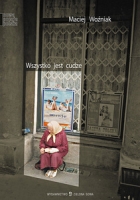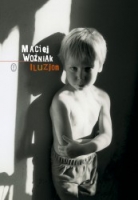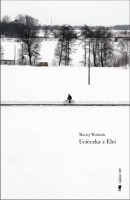Maciej Woźniak
Elizabeth Bishop "Jedyna sztuka"
Sztuka tracenia potrafi być prosta;
tak wiele rzeczy wyraźnie chce przepaść,
że kiedy znikną, to jest żadna rozpacz.
Trać co dzień, jakbyś uczył się rzemiosła:
zgub klucze, pozwól niech ci czas ucieka.
Sztuka tracenia potrafi być prosta.
Ćwicz tak, by suma straconego rosła:
pejzaży, imion i miejsc, w które jechać
nie zdążysz. Przecież to jest żadna rozpacz.
Zgubić zegarek, co po matce został,
sprzedać dom, skoro już nikt w nim nie czeka.
Sztuka tracenia potrafi być prosta.
Stracić dwa miasta, cóż to jest przy włościach
o wiele większych. Lecz stracona rzeka
albo kontynent to też żadna rozpacz.
Że cię nie stracę (choć twój głos i postać
tak bardzo kocham), też nie chcę przyrzekać.
Sztuka tracenia potrafi być prosta,
choć tak wygląda (no, napisz to!) rozpacz.
One Art
The art of losing isn't hard to master;
so many things seem filled with the intent
to be lost that their loss is no disaster.
Lose something every day. Accept the fluster
of lost door keys, the hour badly spent.
The art of losing isn't hard to master.
Then practice losing farther, losing faster:
places, and names, and where it was you meant
to travel. None of these will bring disaster.
I lost my mother's watch. And look! my last, or
next-to-last, of three loved houses went.
The art of losing isn't hard to master.
I lost two cities, lovely ones. And, vaster,
some realms I owned, two rivers, a continent.
I miss them, but it wasn't a disaster.
- Even losing you (the joking voice, a gesture
I love) I shan't have lied. It's evident
the art of losing's not too hard to master
though it may look like (Write it!) like disaster.
tak wiele rzeczy wyraźnie chce przepaść,
że kiedy znikną, to jest żadna rozpacz.
Trać co dzień, jakbyś uczył się rzemiosła:
zgub klucze, pozwól niech ci czas ucieka.
Sztuka tracenia potrafi być prosta.
Ćwicz tak, by suma straconego rosła:
pejzaży, imion i miejsc, w które jechać
nie zdążysz. Przecież to jest żadna rozpacz.
Zgubić zegarek, co po matce został,
sprzedać dom, skoro już nikt w nim nie czeka.
Sztuka tracenia potrafi być prosta.
Stracić dwa miasta, cóż to jest przy włościach
o wiele większych. Lecz stracona rzeka
albo kontynent to też żadna rozpacz.
Że cię nie stracę (choć twój głos i postać
tak bardzo kocham), też nie chcę przyrzekać.
Sztuka tracenia potrafi być prosta,
choć tak wygląda (no, napisz to!) rozpacz.
One Art
The art of losing isn't hard to master;
so many things seem filled with the intent
to be lost that their loss is no disaster.
Lose something every day. Accept the fluster
of lost door keys, the hour badly spent.
The art of losing isn't hard to master.
Then practice losing farther, losing faster:
places, and names, and where it was you meant
to travel. None of these will bring disaster.
I lost my mother's watch. And look! my last, or
next-to-last, of three loved houses went.
The art of losing isn't hard to master.
I lost two cities, lovely ones. And, vaster,
some realms I owned, two rivers, a continent.
I miss them, but it wasn't a disaster.
- Even losing you (the joking voice, a gesture
I love) I shan't have lied. It's evident
the art of losing's not too hard to master
though it may look like (Write it!) like disaster.

Maciek Woźniak
fot. EW
fot. EW

"Wszystko jest cudze", Wydawnictwo Zielona Sowa, Kraków 2005

"Iluzjon", Wydawnictwo Literackie, Kraków 2008

"Ucieczka z Elei", WBPiCAK w Poznaniu, 2010

"Six Polish Poets", Arc Publications, Londyn 2008



